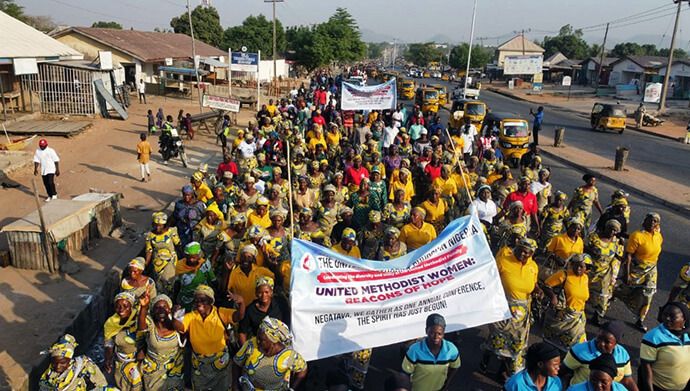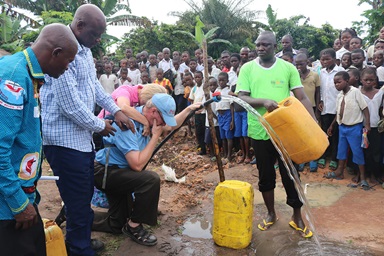Key points:
- At least seven church property cases are before the courts in Liberia.
- A court ruled in favor of the Liberia Annual Conference on March 1, condemning attacks on United Methodist pastors and the removal of church signage at disputed properties.
- The tension also has resulted in violence in both countries, including an attack this week on Nigeria Area Bishop Ande I. Emmanuel and other United Methodists.
- United Methodist conference sessions in both Liberia and Nigeria confirmed the traditional definition of marriage and also showed support for the denomination’s worldwide regionalization plan.
United Methodists in parts of West Africa remain locked in struggle with members of the Global Methodist Church, as both sides fight for control and ownership of United Methodist properties.
In Nigeria and Liberia, the conflict has spilled over into the courts, where hearings are set for several property disputes. The tension also has resulted in violence in both countries, including an attack this week on vehicles carrying Nigeria Area Bishop Ande I. Emmanuel and other United Methodists traveling with him following a joint assembly of the annual conferences there March 17-23. Attacks in December left three dead in Munga Dosso, Nigeria.

Amid the turmoil and legal battles, United Methodists in both countries have continued to focus on the church’s broader work. In separate conference sessions, they indicated support for the denomination’s plan for worldwide regionalization — a realignment that would give each of the church’s geographic areas equal decision-making authority; and they adopted resolutions defining marriage as being between a man and a woman, countering accusations by Global Methodists about the denomination’s stand on marriage.
Former United Methodists launched the Liberia branch of the Global Methodist Church on Feb. 14 and immediately sought to wrest control of some United Methodist sanctuaries. This led to the March 2 arrest and brief detention of the Rev. Jerry Kulah, leader of the Global Methodists in Liberia, for allegedly violating a court order.
Bishop Samuel J. Quire Jr., who leads The United Methodist Church’s Liberia Conference, confirmed that the church was fighting for control of several sanctuaries.
“Immediately following our 192nd annual conference session, the Global Methodist Church began to seize some of our local churches by force, criminally removing our logos from the edifices and replacing them with GMC insignia,” Quire said. “This has led The United Methodist Church to resort to the legal process.”
He confirmed that seven property cases are before the courts in Liberia. “The legal process is very tedious and cost intensive. We’re very hopeful that with God on our side and some financial support from our partners, we will overcome,” he said.
“While we were at our conference, a GMC surrogate filed an injunction in court for the sole purpose of disrupting and closing down of our conference. By the grace of God, this attempt was thwarted by our legal team. Praise be to God!” Quire said.
Jefferson Boye Knight, the director of Human Rights Monitor and vice president of the men’s organization in the Kakata-Farmington River District, said, “The attack on The Liberia Annual Conference is not merely a confrontation between two factions; it represents a larger struggle for the soul of our faith community.”
Knight cited unrest at the Duahzon United Methodist Church in Margibi County, where over 300 congregants gathered for worship but were met with hostility when a group of Global Methodist supporters appeared, claiming rights to the same space.
“This situation escalated to the point where police intervention was necessary,” Knight said. “They instructed both parties to refrain from entering the church building until a court could adjudicate the rightful ownership. In a commendable display of faith and resolve, the UMC members sought refuge in the Bishop Judy Craig Children Village to continue their worship, only to be attacked again.
“We urge all members of the UMC to not only pray for a resolution but also to take up arms — not of violence, but of unwavering conviction, solidarity and love,” he said. “Together, we can ensure that our churches remain havens of peace, acceptance and unity in Christ, undeterred by outside forces intent on division.”
United Methodist properties in contention in Liberia include 72nd United Methodist Church, New Georgia, Ebenezer, James Edward Marshall, St. Matthew and Doe Juah sanctuaries.
Paynesville Magistrates Court ruled in favor of the Liberia Annual Conference on March 1, condemning the attack on pastors appointed by Bishop Quire and the removal of United Methodist Church signage.
“The court caution(s) all parties against violence as there is no excuse for violation,” the judgment stated. “As for the issue of access to the church, the court says the disassociating party should allow the church to remain at status quo pending the decision of the civil law court. That is to say whoever that was in charge of the church in terms of the LAC UMC that supervise the church remain in charge of that church until the court decide.”
Several other cases regarding Liberia Annual Conference properties are also set to be heard in court.

Kulah confirmed he was arrested and briefly detained for about two hours: “I was arrested and released; now I am a free man.” He said no charges were filed against him.
He asserted that he was arrested “at the 72nd Global Methodist Church,” one of the disputed properties.
“The police said they heard that there was rioting and stone throwing,” Kulah said. “They could not answer when I asked who was rioting. When church members gather to worship in an open space were they rioting among themselves? They could not answer, and there was no video footage to back up their allegations.”
To fight misinformation that the Liberia Annual Conference was “a gay church,” the 192nd session, held Feb. 10-16, adopted a resolution affirming the position taken by the denomination’s West Africa Central Conference gathering in December.
“Marriage within The United Methodist Church in the West Africa Central Conference is defined as a union between a man and a woman, consistent with Biblical standards, applicable to the national laws, traditions and customs of annual conferences within the central conference,” the resolution stated.
The session also authorized the conference board of trustees “to take all necessary legal actions, including but not limited to litigation, to codify, document, secure and recover all real and personal properties held in trust for the Liberia Annual Conference of the UMC.”
Quire said major achievements of the Liberia Conference session included electing annual conference leadership and votes on the denomination’s worldwide regionalization plan, which conference voters overwhelmingly supported.
To be ratified, regionalization requires the support of at least two-thirds of the total number of voters at annual conference sessions around the world. Sessions will be holding votes through October, and the Council of Bishops expects to announce whether regionalization has received the necessary vote totals for ratification in early November.
Meanwhile, The United Methodist Church in Nigeria has initiated legal processes to recover properties taken by former members who have joined the Global Methodist Church. The properties include the conference secretariat (head offices), sanctuaries, orphanages, schools and bank accounts. The United Methodist Church in Nigeria is also suing the Corporate Affairs Commission to restore its registration as a religious denomination.
A court hearing set for March 3 was postponed to April 28, to give defendants time to file legal papers.
As in Liberia, church leaders in Nigeria also unanimously resolved to uphold the West Africa Central Conference’s traditional definition of marriage as a union between a man and a woman who are of consenting age. The resolution came during the joint assembly for The United Methodist Church’s Southern Nigeria, Northern Nigeria, Central Nigeria and North East Nigeria conferences.
The joint conference witnessed the ordination of 65 pastors and deacons and also overwhelmingly voted for the worldwide regionalization plan of The United Methodist Church.
Other resolutions focused on developing youth leaders, revitalizing the Clean Water Project to buy a borehole-drilling rig, observing Partnership Sunday and centralizing pastors’ salaries. The meeting also resolved that pastors returning from the Global Methodist Church should follow due process and adhere to United Methodist Church rules and regulations of reinstatement as enshrined in the Book of Discipline and ordination creeds.
Subscribe to our
e-newsletter
“The United Methodist Church in Nigeria is a powerful church, though it has passed through a crisis of lack of effective leadership over the past two decades,” Nigeria’s Bishop Emmanuel said. “Now things are turning around, people are turning to us to offer something different, and we are trying to make sure we build a united body and create space for everyone that wants to belong and practice their God-given talent.”
Following the joint assembly on March 25, Emmanuel reported that one of the church’s vehicles carrying United Methodists who had attended the meeting was attacked as it headed to Bambur in Karim Lamido for ministry work. Emmanuel said the vehicle was stopped by people chanting Global Methodist Church of Nigeria slogans. While no one was injured, one vehicle was damaged and the group was forced to reroute off-road.
“The United Methodist Church in Nigeria just held a successful annual conferences session with an overwhelming support for the worldwide regionalization, which ignited the anger of the GMC supporters in Karim Maunde,” Emmanuel said.
Bishops Quire and James Boye-Caulker of Sierra Leone and the Rev. Neal Christie, principal of the Religious Nationalisms Project, were among those traveling with Emmanuel when the vehicle was ambushed. Christie, who served for 24 years as an executive at the United Methodist Board of Church and Society, is working with leadership to address conflict in the episcopal area.
“This is patterned and repeated and systematic. It is not haphazard,” Christie told UM News after the attack. “Destruction of property, closed property, churches that the bishop and conference staff and international guests like us cannot get to, theft of property, lawsuits, slander in public, slander across the church” are all happening, he said.
The Council of Bishops released a statement decrying this week’s attack and expressing gratitude that Emmanuel and his team escaped physical harm. The bishops also implored United Methodists in Nigeria not to retaliate.
“As Jesus Christ’s followers, we encourage you to continue being beacons of hope, peace, and love in the midst of chaos,” said Bishop Tracy S. Malone, Council of Bishops president. “We also pray for the people of Nigeria, that all may know peace, justice and reconciliation.”
Christie said conflict resolution in the region will take time, but it’s important to name the root causes, which he said are connected to fear.
“We need sustained relationships where we shift the culture, community by community, in huge episcopal areas that are divided by very challenging roads and infrastructure. And, in this case, divided by the narrative that the GMC manipulates the public and the courts with.”
He said United Methodists in Nigeria have seen their personal property targeted and been intimidated by some of those who have left the church.
“I am amazed that hundreds and thousands of United Methodist choose to stay United Methodist even in the face of threat. Muslims and traditional religious leaders respect the UMC; they pray for us. They want social development and they want peace,” he said.
Chikwanah is a UM News correspondent based in Harare, Zimbabwe. The Rev. Filibus Bakari Auta, communications director for the Nigeria episcopal area, contributed to this report.
News media contact: Julie Dwyer at (615) 742-5470 or [email protected]. To read more United Methodist news, subscribe to the free UM News Digests.




